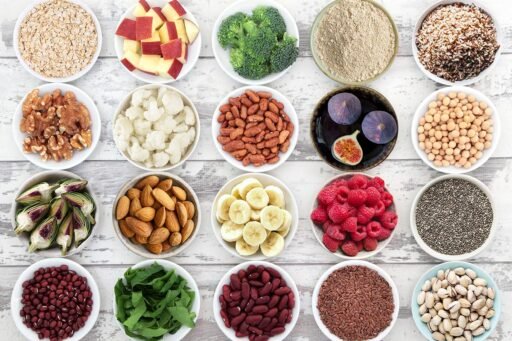In recent years, the intersection of technology and food has accelerated at an unprecedented rate. From the development of plant-based meat alternatives to the rise of food delivery apps, technology has revolutionised the way we eat, purchase, and think about food. One of the most exciting and trans formative innovations driving this change is artificial intelligence (AI). With the ability to analyse vast amounts of data, make predictions, and automate processes, AI is reshaping diets, transforming how we plan meals, track nutritional intake, and even cultivate food. This article explores how AI is influencing the future of diets and nutrition, and what it means for the way we eat in the coming decades.
AI in Personalized Nutrition
One of the most profound impacts of AI in the food industry is its ability to personalise diets. In the past, dietary recommendations were largely based on general guidelines, with little to no consideration of an individual’s specific genetic makeup, health conditions, lifestyle, and preferences. AI has the potential to radically shift this approach, offering highly personalized nutrition plans that can optimize an individual’s health outcomes.
- Genetic-Based Diets
Companies like Nutrigenomix and DNAfit use AI to analyze genetic data to provide insights into an individual’s nutritional needs. By examining specific genes, these services can offer personalized recommendations on macronutrient ratios (proteins, fats, and carbohydrates), as well as advice on micronutrient intake (vitamins and minerals). For example, someone with a genetic predisposition to low levels of vitamin D may receive dietary advice to incorporate more vitamin D-rich foods or supplements. - AI-Powered Meal Plans and Apps
Apps like Noom, Yazio, and MyFitnessPal use AI to analyze users’ eating habits, track their food consumption, and create custom meal plans that align with their health goals. These platforms leverage machine learning algorithms to not only assess the nutritional value of what a person eats but also to recommend recipes tailored to their tastes, allergies, and dietary restrictions. With the use of AI, these apps can even predict future food cravings or suggest healthier alternatives based on behavioral patterns. - Health Monitoring and Feedback
AI-powered devices like wearables (e.g., Fitbit, Apple Watch) and continuous glucose monitors are providing real-time feedback on individuals’ health metrics, such as blood sugar levels, heart rate, and activity. These devices can be integrated with AI algorithms to suggest dietary changes in real time. For example, if a person’s glucose levels spike after consuming a certain food, the system can recommend alternative foods that have a lower glycemic impact, helping individuals manage conditions like diabetes more effectively.
AI and the Future of Food Production
AI is also playing a pivotal role in reshaping how food is produced, which, in turn, influences the diets we have access to. Innovations in food production, especially those aimed at sustainability, efficiency, and nutritional value, are revolutionizing how food is grown, processed, and distributed.
- Precision Agriculture
AI is transforming the agricultural industry by improving the efficiency of food production through precision agriculture. Machine learning algorithms can analyze vast datasets from sensors and satellite images to optimize irrigation, monitor soil health, and predict crop yields. By reducing the use of water, pesticides, and fertilizers, AI is helping to create more sustainable food systems. This efficiency can lead to higher-quality, nutrient-rich crops that provide consumers with better options for healthier diets. - Plant-Based and Lab-Grown Foods
AI is driving innovation in the development of plant-based and lab-grown foods, which are increasingly being seen as sustainable alternatives to traditional animal-based products. AI is being used in the creation of more convincing plant-based meat products, like those from Impossible Foods and Beyond Meat. These companies use AI and machine learning to analyse the molecular structure of animal meats and replicate their textures, flavours, and nutritional profiles using plants. Lab-grown meat, also known as cultured or cellular agriculture, is another area where AI is having a significant impact. By using AI to monitor and adjust conditions in bioreactors (where animal cells are grown into muscle tissue), companies like Memphis Meats and Eat Just are developing meat products without the environmental and ethical challenges of conventional livestock farming. - Food Waste Reduction
AI is helping to reduce food waste, which has a significant impact on both environmental sustainability and food security. Algorithms can predict food demand more accurately, helping farmers and retailers minimize overproduction and overstocking. AI tools can also monitor the shelf life of perishable items and suggest recipes to use up food before it expires. In addition, AI-powered platforms can connect food providers with local charities to redistribute excess food to those in need.
AI and the Future of Dietary Trends
AI is not only changing the way we eat and produce food, but it is also shaping the broader trends in diets and health, often by anticipating and responding to evolving consumer preferences.
- Emerging Dietary Patterns
AI algorithms are increasingly being used to track emerging dietary patterns and predict future trends. By analyzing data from social media, search engines, and online shopping behaviours, AI can spot rising trends in food preferences, like the growing interest in plant-based or low-carb diets. This helps food companies develop products that meet these demands and allows consumers to stay ahead of dietary trends. - Automated Cooking and Smart Kitchens
The future of cooking is being shaped by AI as well. Smart kitchen devices, such as connected ovens, refrigerators, and cooking assistants, are becoming more common. These devices use AI to provide personalized cooking recommendations based on an individual’s dietary goals and preferences. For example, smart ovens can suggest recipes, adjust cooking temperatures based on the type of food being prepared, and even help people track their caloric intake. Robotic chefs and automated cooking systems are also emerging as potential game-changers, with companies like Moley Robotics and Picnic developing AI-powered robotic kitchens that can cook complex meals from scratch. This can make it easier for consumers to prepare nutritious, balanced meals at home with minimal effort, even if they have limited cooking skills or time. - Nutrient Profiling and AI-Enhanced Food Labels
AI is being used to create more detailed and accurate nutrient profiles for food products. Through image recognition and deep learning algorithms, AI can analyze food ingredients and packaging to generate more accurate nutrition labels, helping consumers make better-informed decisions. Additionally, AI could one day provide “smart” labels that offer personalized nutritional recommendations based on an individual’s health profile and goals. These labels could suggest how a particular product fits into an individual’s overall diet, offering real-time insights into the best choices for optimal health.
Ethical Considerations and Challenges
Despite the many benefits AI brings to the food industry, there are also ethical and societal challenges that need to be addressed:
- Privacy and Data Security
The use of AI in personalized nutrition and health tracking relies heavily on the collection of personal data. This raises concerns about privacy and the potential misuse of sensitive information. Consumers need assurance that their data will be handled securely and used ethically, especially when it comes to health data. - Bias in AI Algorithms
AI algorithms are only as good as the data they are trained on. If the data sets used to create AI models are biased or incomplete, the recommendations and insights they provide may not be universally applicable. For example, algorithms trained on data from predominantly Western diets may not be suitable for people from other cultural or dietary backgrounds. - Food Accessibility and Equity
While AI promises to make food production more efficient, there is a risk that these advancements could further widen the gap between affluent and low-income communities. Access to personalized AI-powered nutrition, sustainable food options, and even high-tech kitchens may be out of reach for many. Ensuring that the benefits of AI in food are accessible to all will be crucial in promoting equity in nutrition.
Conclusion
Artificial intelligence is undeniably transforming the food industry, particularly in the realm of diets and nutrition. From offering personalised meal plans based on genetic information to improving the efficiency and sustainability of food production, AI is reshaping the way we eat, live, and think about food. As we look to the future, AI promises to continue driving innovation in the food sector, making it easier to access healthier, more sustainable, and personalised dietary choices. However, as with any technological advancement, it is important to navigate the ethical, privacy, and equity challenges to ensure that AI’s impact on the food industry is positive for all. The intersection of technology and food is only just beginning, and it holds the potential to revolutionise not only our diets but the entire food ecosystem.































